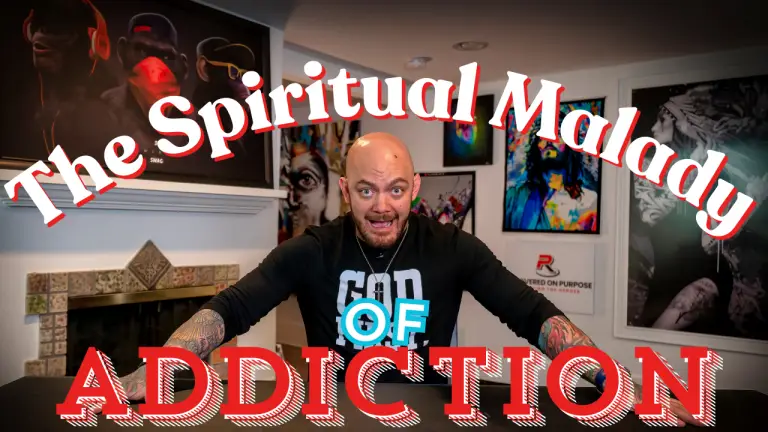Understanding the Spiritual Malady in AA and its Impact on Recovery
In Alcoholics Anonymous (AA), “spiritual malady aa” refers to the inner disconnection and turmoil that often drives addiction. This concept is crucial because addressing it is essential for recovery. Through the 12-Step program, AA helps members overcome this spiritual disruption, fostering long-lasting sobriety and well-being.
Key Takeaways Defining the Spiritual Malady Meaning
- Spiritual malady in AA refers to a profound sense of disconnection and unrest, a key driver of addiction that must be addressed for recovery.
- A connection with a higher power is critical for overcoming spiritual malady, with practices like prayer, meditation, and acts of service fostering spiritual growth.
- Integrated treatment programs and a strong support system, including professional help and community-based organizations, are essential for sustainable recovery from addiction.
Recovered On Purpose provides essential 4th Step worksheets to help people overcome the spiritual malady by working through their resentments, fears, and past harms.
Overcome the Spiritual Malady With the 4th Step
Resentment Inventory Worksheet Fear Inventory Worksheet Sex Inventory WorksheetDefining Spiritual Malady in Alcoholics Anonymous
In Alcoholics Anonymous (AA), the term “spiritual malady” refers to a profound sense of disconnection and unrest that many alcoholics experience. This malady is not merely a feeling of otherness; it is a deep-rooted sickness of the soul that can drive individuals to seek solace in alcohol and other substances. The Big Book of AA describes alcoholism as a three-fold disease: a physical allergy, a mental obsession, and a spiritual malady. This spiritual aspect is crucial, as it underpins the entire cycle of addiction and recovery.
In the lives of many AA members, including an alcoholic’s life, the spiritual malady appears as a profound void—an emptiness we often try to fill with alcohol and other external things. This emptiness gives rise to feelings of resentment and discontent, which in turn aggravates our spiritual sickness. Living a double life, with one side consumed by alcohol, only deepens this malady. As highlighted in the Big Book, surmounting this spiritual malady is key to achieving mental and physical recovery from untreated alcoholism.
Understanding spiritual malady is pivotal for anyone on the path to recovery. It is a call to address not just the physical and mental aspects of addiction but the spiritual disconnection that lies at its core. By recognizing and confronting this spiritual disease, we can begin to heal and reclaim our lives from the grip of addiction. When spiritual malady is overcome, a sense of wholeness and well-being can be restored.
The Concept of Spiritual Disease
The concept of spiritual disease is deeply embedded in the philosophy of AA. It is rooted in the idea of being spiritually sick—a condition that profoundly affects our soul and emotional nature. This spiritual disease is not a physical ailment but a profound affliction of the spirit, manifesting as a sense of emptiness and disconnection from oneself and the world.
Being spiritually sick means experiencing a persistent void that no external remedy can fill. This spiritual disease affects every aspect of our lives, leading to feelings of isolation, loneliness, and despair. It is this spiritual emptiness that we often try to escape from through alcohol and other addictive behaviors, which can also make us physically ill.
Grasping this concept allows us to truly understand the necessity of spiritual healing in our recovery journey.
Symptoms of Spiritual Malady
Another significant symptom is the challenge in personal relationships. The Big Book of AA identifies these difficulties, or “bedevilments,” as clear indicators of spiritual malady. The sense of loneliness and isolation that comes with spiritual disconnection can exacerbate these challenges, making it even harder for us to maintain healthy relationships and find true solace.
The symptoms of spiritual malady can vary greatly, yet they are profoundly impactful. Common signs include irritability, restlessness, and a pervasive sense of discontent. These feelings often drive us to seek relief through alcohol, creating a vicious cycle of dependence and escapism. Untreated spiritual malady can lead to a deep sense of dissatisfaction and disconnection, further fueling our addiction.
Big Book of AA Definition of Alcoholic

A connection with a higher power is intrinsically tied to overcoming spiritual malady. Addiction is not only a disease of the brain but also of the spirit, highlighting the critical role of spiritual healing in recovery. In the 12-Step Program, integrating a higher power into our lives is a cornerstone of combating addiction. This connection with a power greater than ourselves is not necessarily religious but is about finding a profound spiritual grounding.
Many discover that acknowledging a higher power aids in letting go of control and finding guidance in the recovery journey. This spiritual connection provides a sense of peace and purpose that can be transformative. Surrendering to a higher power enables us to tackle the deep-rooted spiritual malady that drives our addiction.
The journey of recovery is deeply personal, and the role of a higher power can vary for each individual. Whether it involves prayer, meditation, or simply a belief in something greater, maintaining conscious contact with this higher power is essential for fostering spiritual growth and overcoming addiction.
Relinquishing Control
Relinquishing control to a higher power is a fundamental step in overcoming addiction. In the 12-Step Program, this surrender is crucial for acknowledging our inability to overcome addiction on our own. By surrendering our ego and self-will, we open ourselves to the guidance and support needed to navigate the recovery journey. This total surrender of one’s ego is essential for finding relief from the burdens of addiction.
Relinquishing Control Involves:
- Acknowledging the chaos our lives have become due to addiction
- Placing our trust in a higher power for restoration to sanity
- Letting go of the illusion of control
- Embracing a path of spiritual growth and healing
Conscious Contact with a Higher Power
Sustaining a conscious connection with a higher power through prayer and meditation is crucial for spiritual development and recovery. Engaging in regular prayer can deepen our connection with a higher power, providing a sense of peace and guidance. This daily practice helps stabilize and clarify our lives, significantly reducing the obsession with substances and offering a sense of freedom.
The 12 Steps of AA encourage improving one’s conscious contact with a higher power, specifically focusing on prayer and meditation in Step 11. By dedicating time to these spiritual practices, we can nurture our spiritual life and find the strength to overcome addiction.
How Spiritual Malady Drives Addiction

Addiction and self-destructive behaviors, including drug addiction, are frequently driven by a spiritual malady, intensifying the recovery struggle for individuals. This internal battle can make the path to healing and change even more challenging. This spiritual disconnection often results in emotional and mental turmoil, exacerbating the compulsion to use alcohol or drugs. The sense of emptiness and unrest that accompanies spiritual malady can lead us to seek solace in substances, perpetuating the cycle of addiction.
Grasping the way spiritual malady drives addiction is vital to break this cycle. By addressing the spiritual disconnection at the root of our addiction, we can begin to heal and find lasting sobriety.
The Mental Obsession
The mental obsession with alcohol, often associated with alcohol use disorder, is a symptom of deeper spiritual unrest and a sense of inner void. This continuous craving for alcohol can be seen as an attempt to fill a spiritual void. The mental obsession is not just about the physical need for alcohol but also a psychological attempt to escape from the pain and emptiness inside.
Recognizing this mental obsession as a symptom of spiritual malady is important for addressing the root cause of addiction. By focusing on spiritual healing, we can begin to alleviate this mental compulsion and find peace.
Selfishness and Self-Centeredness
Selfishness, self-centeredness, and self seeking are manifestations of spiritual malady that contribute to the cycle of addiction. The Big Book cites the ego as the driving force behind these symptoms, further isolating us and exacerbating our addiction. The selfish behavior focuses on personal gratification rather than meaningful connections, perpetuating the cycle of addiction caused by selfishness self centeredness.
Addressing selfishness, self-centeredness, and self pity is crucial for overcoming spiritual malady. By fostering empathy and meaningful connections, we can break free from the isolation and find a path to recovery.
Addressing The Spiritual Malady Through the 12 Steps
The 12 Steps of AA are formulated to tackle and rectify spiritual malady, fostering spiritual awakening and recovery. The foundation of the 12-Step Program involves implementing a higher power in our lives, emphasizing the spiritual aspect of addiction recovery. From admitting powerlessness over alcohol to making a moral inventory and admitting wrongs, each step plays a crucial role in spiritual healing.
Living by the principles of AA helps maintain spiritual fitness and reduces the influence of spiritual maladies. Daily practice of these principles can lead to sustained sobriety and spiritual development.
Steps Toward Spiritual Awakening
Spiritual awakening in AA often begins with Step 3, which involves deciding to turn one’s will and life over to a higher power. Living by spiritual principles as outlined in the 12 Steps can help alleviate the symptoms of spiritual malady and promote spiritual growth.
By embracing these steps and principles, we can experience a profound transformation and find peace and purpose in our recovery journey.
Personal Relationships and Recovery
Focusing on self-love and repairing personal relationships is crucial for overcoming spiritual malady and achieving sobriety. AA recommends waiting a year before entering into new personal relationships to focus on self-love and recovery.
Repairing personal relationships and focusing on oneself during the initial year of recovery helps create a stronger foundation for personal growth and stability. This focus on self-love and relationships is essential for long-term sobriety.
Practical Ways to Improve Spiritual Life Daily
The 12 Steps of AA are formulated to tackle and rectify spiritual malady, fostering spiritual awakening and recovery. The foundation of the 12-Step Program involves implementing a higher power in our lives, emphasizing the spiritual aspect of addiction recovery. From admitting powerlessness over alcohol to making a moral inventory and admitting wrongs, each step plays a crucial role in spiritual healing.
Living by the principles of AA helps maintain spiritual fitness and reduces the influence of spiritual maladies. Daily practice of these principles can lead to sustained sobriety and spiritual development.
Steps Toward Spiritual Awakening
Spiritual awakening in AA often begins with Step 3, which involves deciding to turn one’s will and life over to a higher power. Living by spiritual principles as outlined in the 12 Steps can help alleviate the symptoms of spiritual malady and promote spiritual growth.
By embracing these steps and principles, we can experience a profound transformation and find peace and purpose in our recovery journey.
Personal Relationships and Recovery
Focusing on self-love and repairing personal relationships is crucial for overcoming spiritual malady and achieving sobriety. AA recommends waiting a year before entering into new personal relationships to focus on self-love and recovery.
Repairing personal relationships and focusing on oneself during the initial year of recovery helps create a stronger foundation for personal growth and stability. This focus on self-love and relationships is essential for long-term sobriety.
Practical Ways to Improve Spiritual Life Daily

Enhancing spiritual life on a daily basis encompasses practices like meditation, mindfulness, gratitude, and acts of service. Spiritual wellness involves developing a purpose in life and having a clear sense of right and wrong. Connecting to inner and outer worlds and living by one’s values and purpose are also vital.
Taking time for reflection, pondering the significance of life events, and practicing forgiveness and compassion are key practices for spiritual wellness. Daily gratitude and journaling help recognize and appreciate the positive aspects of life, fostering spiritual growth.
Meditation and Mindfulness
Meditation and mindfulness are powerful tools for maintaining conscious contact with a higher power and enhancing spiritual well-being. Practices like mindfulness, meditation, and yoga help us stay present in the moment, reduce stress, and awaken the spirit. Meditation is about relaxing the body, quieting the mind, and fostering a deep connection with our spiritual selves.
Walking meditation, using labyrinths, and mandalas are also effective methods for finding peace and clarity. These practices help us manage stress, overcome mental obsession, and maintain a balanced, spiritually enriched life.
Acts of Service
Engaging in acts of service is a powerful way to foster empathy, strengthen spiritual foundations, and counteract feelings of isolation. Caring for others and acting for the welfare of the community are signs of spiritual wellness. Volunteering time and resources to help those in need can build empathy and provide a sense of belonging and purpose, while also helping us understand our emotional natures.
Acts of service not only benefit others but also contribute to our own spiritual growth. Helping others helps build a stronger spiritual foundation, counteracting selfishness and promoting a sense of connectedness and community.
Professional Help for Spiritual Malady and Addiction
Professional assistance is often required to tackle spiritual malady and addiction. Seeking professional treatment is crucial to address both the physical and spiritual dimensions of addiction. Integrated treatment programs offer a combination of medical detox, therapy, and spiritual support to provide comprehensive care for addiction.
SAMHSA’s National Helpline is a valuable resource for those facing mental and substance use disorders, offering confidential, free support and referrals to local treatment facilities, support groups, and community-based organizations. Professional assistance offers a structured environment necessary for detox and recovery, catering to the needs of the whole person, including their spiritual requirements.
Identifying the right support system is crucial for sustainable recovery. A supportive environment that understands the spiritual aspects of recovery can provide more meaningful assistance. Maintaining close relationships with AA sponsors and community-based support groups tailored to spiritual recovery can help avoid distractions and reinforce the recovery process.
Integrated Treatment Programs
Integrated treatment programs provide holistic care by amalgamating medical detox, therapy, and spiritual counseling. These programs are designed to address the whole person, providing both medical and psychological support to facilitate recovery. Detox specialists can provide guidance on the best treatment options, ensuring that both physical and spiritual aspects of addiction are addressed.
SAMHSA’s National Helpline is an excellent resource for individuals seeking help, offering confidential support and connecting them with local treatment facilities and support groups. By seeking professional help, individuals can find a structured path to recovery that encompasses all dimensions of their well-being.
Finding the Right Support System
An environment that is supportive and appreciates the spiritual aspects of addiction is crucial for sustained recovery. Maintaining close relationships with AA sponsors is critical, particularly in the first year of recovery, to avoid distractions and stay focused on healing.
Community-based organizations often offer support groups tailored to spiritual recovery, providing a network of individuals who understand the challenges and triumphs of the recovery journey. Finding the right support system can make a significant difference in maintaining sobriety and fostering spiritual growth.
Summary of The Spiritual Malady Meaning
Understanding spiritual malady and its impact on recovery is essential for anyone battling addiction. This deep-seated sense of disconnection and unrest drives the cycle of addiction and self-destructive behaviors. By addressing this spiritual disease through connection with a higher power, the 12 Steps, and professional help, individuals can find a path to lasting sobriety and holistic healing.
Integrating practices such as meditation, mindfulness, and acts of service into daily life can further enhance spiritual well-being and foster a sense of peace and purpose. With the right support system and a commitment to spiritual growth, overcoming spiritual malady is not only possible but transformative, leading to a fulfilling and sober life.
Frequently Asked Questions About The AA Spiritual Malady
What is the meaning of a spiritual malady in AA?
In AA, a spiritual malady refers to the deep internal restlessness, irritability, and discontent that fuels addiction. It manifests as fear, resentment, selfishness, and a sense of separation from others and a higher power. The Big Book teaches that overcoming this spiritual sickness through the 12 Steps leads to true freedom and lasting sobriety.
How does the AA Big Book define a spiritual malady?
The AA Big Book describes a spiritual malady as the inner turmoil, selfishness, and fear that drive addiction. It appears in the bedevilments—feeling restless, anxious, and disconnected from others. The book teaches that recovery requires a spiritual solution, where working the 12 Steps restores sanity and connection to a higher power.
What page of the AA Big Book discusses the spiritual malady?
The concept of spiritual malady is discussed on page 64 of the AA Big Book. It explains that addiction stems from a threefold illness—physical craving, mental obsession, and spiritual sickness. The book emphasizes that without addressing the spiritual malady through the 12 Steps, lasting recovery is impossible, making spiritual healing essential.
When the spiritual malady is overcome, what changes in a person’s recovery?
When the spiritual malady is overcome, a person experiences inner peace, freedom from resentment, and a restored connection with others and a higher power. Fear and selfishness are replaced with gratitude and purpose. This transformation allows for lasting sobriety, emotional stability, and the ability to live a meaningful, service-driven life in recovery.
What are the bedevilments in AA, and how do they relate to a spiritual malady?
The bedevilments are found on page 52 of the AA Big Book and state:
“We were having trouble with personal relationships, we couldn’t control our emotional natures, we were prey to misery and depression, we couldn’t make a living, we had a feeling of uselessness, we were full of fear, we were unhappy, we couldn’t seem to be of real help to other people.”
These struggles are symptoms of the spiritual malady, which must be addressed through the 12 Steps to achieve lasting sobriety and freedom.
Adam Vibe Gunton is an American author, speaker and thought leader in addiction treatment and recovery. After overcoming homelessness and drug addiction, Adam found his life’s purpose in helping addicts find the same freedom he found. As Founder and Executive Director of the 501(c)3 nonprofit, Recovered On Purpose, and Managing Partner of Behavioral Health Partners, Adam has helped thousands find freedom from addiction all over the world.
